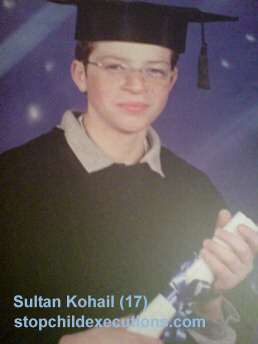 man Canada.com
man Canada.comAn overturned court decision in Saudi Arabia has a Montreal teenager facing execution for his alleged role in murder case that already has put his brother on death row. Sultan Kohail, 18, and his older brother Mohamed were both implicated in the death of a Syrian student following a brawl in the Red Sea port city of Jidda last year.
The setback for the younger Kohail comes after he appealed his initial sentence of 200 lashes and a year in prison.
Rather than commuting the original verdict, the appeal court ruled that Kohail should instead be tried as an adult, leaving open the possibility of a public beheading.
“Transferring Sultan Kohail’s case to an adult court is very troubling given the possibility of him receiving the death penalty,” said Liberal MP Dan McTeague, who along with several Conservative cabinet members have lobbied kingdom officials for clemency.
Sultan remains free and is living with his family in Jidda, his uncle Abdul Rauf said Wednesday in a phone interview from Jidda. Sultan is depressed and is spending a lot of time at home, Rauf said.
“It’s something hard for him,” Rauf said.
The boy’s father Ali Kohail, also in Jidda, said the family is pinning their hopes on yet another appeal to a higher court.
“We could hear something in 15 days,” the weary-sounding Kohail said. “We are working very hard with our lawyer but I don’t know what will happen.”
The two suspects, of Palestinian extraction, have maintained their innocence and insist that the Saudi courts have not afforded them a fair hearing. Alleging that they were forced to make confessions of guilt, they insist that they were nowhere near the victim, a Syrian expatriate named Munzer Al-Hiraki, when he sustained the injuries that led to his death.
In January 2007, a schoolyard fight broke out after a girl’s male cousin accused Sultan of insulting her. Sultan, 16 at the time, said he asked Mohamed for help when he was confronted by several boys over the remark. At some point, a stone fence either toppled on to Al-Hiraki or his face was bashed into it, events which led to the brothers’ arrest.
Since the initial convictions, Mohamed Kohail, 23, has only had a little more luck than his younger sibling.
Sentenced to a public execution last March after a 90-minute trial that included few if any witnesses, Kohail has unsuccessfully appealed his case twice, and according to McTeague’s office, he is on this third attempt.
The appellate court also has the power to take over the case from the lower court but has so far refused. Still, McTeague sees the judicial back and forth as an encouraging sign, suggesting that appellate court refuses to uphold the lower court’s rulings.
Ali Al Ahmed, an expert on Saudi affairs who is director of the Gulf Institute in Washington, D.C., sees a bigger invisible hand in the legal process. “Usually after a sentence is done, it’s done. Period. But the implication in Sultan’s case is that there is some pressure applied, and it seems to come from the murdered man’s family.”
Al Ahmed said that the victim’s family comes from a well-to-do, influential Syrian family that claims it can trace its roots to the Prophet Muhammad. The Saudis, he added, often apply the legal terms of minor and adult liberally, with children as young as 11 facing execution.
The sudden reversal suggests a deliberate intention to pursue the death sentence, he said. “This is what they are aiming for. Otherwise, why change things?” The Kohail family immigrated to Canada from Saudi Arabia in 2000, settling in Quebec.
Six years later, they returned to Jidda, where they run a furniture business but did not have status as Saudi citizens.
To read more about Sultan visit:
http://scenews.blog.com/2961086/
http://scenews.blog.com/2949314/
http://scenews.blog.com/1828693/
http://scenews.blog.com/1820801/